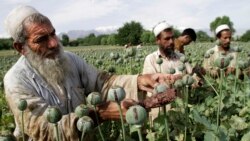Afghanistan is the world’s leading source of opium, producing about 80 percent of the world’s supply. Illegal opium production and trade engenders corruption, undermines good governance, and subverts the legal economy. This past summer, Afghan troops assumed the lead for security throughout the country, which includes responsibility for curtailing the country’s drug trade.
Though challenges remain, the Afghan National Security Forces, or ANSF, with U.S. support, have made real progress in combating the illicit drug trade and developing the capability and capacity to lead counternarcotics efforts.
“There is no silver bullet to eliminate drug cultivation or production in Afghanistan,” said Assistant Secretary of State for International Narcotics and Law Enforcement Affairs William Brownfield recently before the Senate Caucus on International Narcotics Control. “But we are successfully building Afghan capacity to implement and lead counternarcotics efforts.”
The United States is working with the government of Afghanistan to develop effective and sustainable programs to minimize all stages of the country’s drug trade. Most opium poppy is cultivated in the least secure areas of the country, where U.S. assistance aims to strengthen government institutions and deliver basic development facilities such as medical clinics and schools.
Helping farmers transition from poppy cultivation to alternative crops is critical, as are strong law enforcement and judicial systems. The United States is helping Afghanistan address these challenges by supporting specialized interdiction units, launching the Food Zone initiative in Kandahar, or funding the Counternarcotics Justice Center, or CNJC, a central Afghan facility for the detention, investigation, prosecution, and trial of major narcotics cases.
Afghanistan has one of the highest opiate usage rates in the world. The United States and other donors helped establish a network of more than 100 drug treatment programs across the country. The Government of Afghanistan is increasingly taking on responsibility for running these centers and providing drug treatment services.
“Counternarcotics efforts within Afghanistan are fundamentally the responsibility of the Afghan government and people,” said Assistant Secretary Brownfield. “Afghanistan’s drug challenge may be formidable, but it is not insurmountable.”
Though challenges remain, the Afghan National Security Forces, or ANSF, with U.S. support, have made real progress in combating the illicit drug trade and developing the capability and capacity to lead counternarcotics efforts.
“There is no silver bullet to eliminate drug cultivation or production in Afghanistan,” said Assistant Secretary of State for International Narcotics and Law Enforcement Affairs William Brownfield recently before the Senate Caucus on International Narcotics Control. “But we are successfully building Afghan capacity to implement and lead counternarcotics efforts.”
The United States is working with the government of Afghanistan to develop effective and sustainable programs to minimize all stages of the country’s drug trade. Most opium poppy is cultivated in the least secure areas of the country, where U.S. assistance aims to strengthen government institutions and deliver basic development facilities such as medical clinics and schools.
Helping farmers transition from poppy cultivation to alternative crops is critical, as are strong law enforcement and judicial systems. The United States is helping Afghanistan address these challenges by supporting specialized interdiction units, launching the Food Zone initiative in Kandahar, or funding the Counternarcotics Justice Center, or CNJC, a central Afghan facility for the detention, investigation, prosecution, and trial of major narcotics cases.
Afghanistan has one of the highest opiate usage rates in the world. The United States and other donors helped establish a network of more than 100 drug treatment programs across the country. The Government of Afghanistan is increasingly taking on responsibility for running these centers and providing drug treatment services.
“Counternarcotics efforts within Afghanistan are fundamentally the responsibility of the Afghan government and people,” said Assistant Secretary Brownfield. “Afghanistan’s drug challenge may be formidable, but it is not insurmountable.”

















